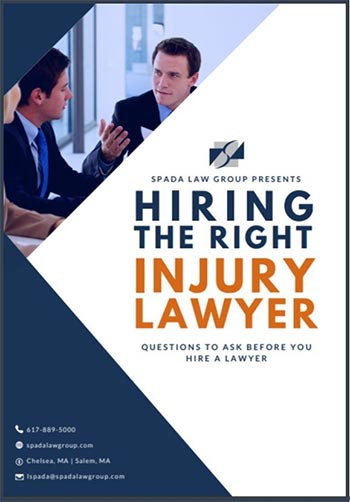
Most people think being at fault for a Massachusetts car accident automatically means they’re out of luck when it comes to bringing an injury case or being entitled to a settlement to recover from their car accident injuries.
Here’s the good news - even if a car insurance company says you’re “at fault” for an auto accident, you may still have an injury case to pursue.
In Massachusetts, there is something known as ‘comparative fault.’ This means you can be partially at fault for causing a car accident but still have a valid personal injury claim against someone else.
What is Comparative Fault in Massachusetts? How Does It Apply to Car Accidents?
As a comparative fault state, Massachusetts allows you to recover damages for injuries from any car or auto accident in which you’re found to be 50% - or less - at fault. This means you can be partly at fault and could even be exactly equally responsible for the accident, yet legally still be entitled to compensation to recover for your injuries.
The law in Massachusetts (General laws, chapter 231, section 85) makes clear that “Contributory negligence shall not bar recovery in any action by any person or legal representative to recover damages for negligence resulting in death or in injury to person ...if such negligence was not greater than [the negligence of the other driver].” It also states, however, that “any damages allowed shall be diminished in proportion to the amount of negligence attributable to [the person seeking to recover damages]”.
This means that whatever percentage of fault for the car accident is attributed to you will be subtracted from the amount of compensation that you’re entitled to. In total, considering yourself and all other parties involved in the accident, the total percentage – when the negligence of all individuals is added together – needs to be 100%. So you can be partially at fault for a car accident but still be able to recover damages as long as you are 50% or less responsible.
Even if You Broke a Law - You’re Not Automatically Disqualified from Collecting Money Damages for Your Injuries
This Massachusetts law even provides that a person may still be eligible for compensation for recovery from injuries even if they violated a criminal law or other rule or regulation which contributed to the injury. The law states, “the violation of a criminal statute, ordinance or regulation by a plaintiff which contributed to said injury, death or damage, shall be considered as evidence of negligence of that plaintiff, but the violation of said statute, ordinance or regulation shall not as a matter of law and for that reason alone, serve to bar a plaintiff from recovery.” Violating a law or a rule will certainly make your case more difficult, but it doesn’t automatically mean you will not be successful in your injury case after a car accident.
Breaking a rule or the law is not reason enough alone to automatically disqualify you from pursuing a personal injury case in Massachusetts.
This is another reason to always consult a personal injury attorney after an accident. So many people, especially if they believe they are partly at fault for causing an accident, are quick to disqualify themselves because they think they don’t have a valid claim. It is always worth consulting with a professional injury attorney who offers free consultations, such as at Spada Law Group, to learn what your options may be.
In Massachusetts, the Law is on Your Side When You’ve Been Injured
Thankfully, you now know that being deemed “at fault” for an accident by an insurance company does not prohibit you from seeking compensation to recover from your injuries. You can be found to have partial fault for causing the accident and still have a profitable claim and be able to recover damages for your injuries.
Thanks to Massachusetts’ comparative negligence law, you can still pursue monetary damages for your injuries even if an insurance company already told you you’re at fault or partially at fault. As we described above, you can be 50% or less at fault and still be entitled to compensation.
In addition to that, we say the law is on your side because of this: the legal burden to prove negligence in an accident is not on the person who files the personal injury claim. If you were injured in a car accident, for example, and you decide to pursue a case against the other person’s insurance even though the insurance company told you you were at fault - it is not your (nor your injury lawyer’s) responsibility to prove your lack of negligence. The legal burden to actually prove - without any doubt - that you were 51% (or more) responsible for an accident that led to injury is on the insurance company.
Similar to the criminal justice system, in which people are given the right to be presumed innocent until proven guilty, someone who files an injury lawsuit has the right to be “presumed to have been in the exercise of due care” at the time of the accident unless the insurance company can prove otherwise.
What’s the Difference Between 50% and 51%?: Boston Injury Lawyer Explains
When it comes to an accident, such as a car accident, in which people were injured, it is up to a jury to determine each person's percentage of fault for an accident. The amount at which you’re determined to be at fault ultimately decides how much money (if any) you’re entitled to receive in damages.
Let’s say you were found to be 20% at fault for an accident that is deemed to be worth $100,000 in a trial. Your recovery will then be reduced by the same percentage you were at fault. This means you would then receive an award of $80,000 for your injuries and related damages.
If you’re found to be 50% or less at fault, you’re legally entitled to commensurate compensation. If, however, you’re found to be more than 50% at fault for an accident – you’re unfortunately not entitled to any recovery in that scenario. You can be partly at fault for an accident and still recover as long as you’re 50% or less at fault.
But who’s to say what the difference is between 50% and 51%? This is certainly not a decision you want to leave to an insurance company. We always advise that you consult an injury lawyer when you’ve been injured in an accident, even if the insurance company has concluded you are at fault. An injury lawyer will have your best interests in mind and they can help make a decision on if you have a viable claim which could lead to compensation.
My advice is to not take the insurance company's assessment of fault as the final word. Talk to an experienced personal injury lawyer who has your best interest in mind before you make any decisions.
Many times, our team has taken on cases that other lawyers and insurance companies believed had no chance of being successful and turned them into recoveries for our injured clients. A thorough investigation and hard work sometimes reveal that an initial fault determination was wrong. Don’t make that call by yourself. Let us help.
How Successful Is a Car Accident Injury Case If You Were Partially at Fault?
It depends! Every case is unique, but there is still a very high chance of successfully settling a case, even if you were contributorily negligent. In fact, you can even go to trial even if the defendant claims you were partly at fault for causing the accident. Whether or not you go to trial is a decision only you can make after discussing options and the strength of your case with your lawyer.
Generally speaking, most personal injury cases in Massachusetts with contributory negligence settle and don’t go to trial if they are "close calls." It often depends on how much a plaintiff is likely to be at fault – If you are the plaintiff with a personal injury case and it appears you might be around 50% at fault, and you were offered a fair settlement offer in light of those facts, agreeing to a settlement may be in your best interest rather than risk a jury finding you 51% at fault and you being left with no recovery. On the other hand, if you think maybe you’re only about 10% at fault and feel confident a jury would also find your partial fault to be very low, you may decide it is in your best interest to go to trial, especially if you have not been offered an adequate settlement offer.
While exact statistics on the percentage of personal injury cases involving comparative negligence in Massachusetts – or their success – aren’t readily available, a plaintiff in a personal injury case can still have a good chance of recovery, even if they bear partial fault.
One of the biggest determinators of your success, if you are found partly at fault for the accident, is the skill of your attorney.
Factors that improve a plaintiff’s chance of success and recovery, despite partial fault, include:
-
Clear Evidence of Liability for the Other Party: Strong evidence showing the other party is responsible for the greater share of fault can help you – the plaintiff – retain a higher portion of the award.
-
Severity of Injuries: Courts and insurers tend to provide higher awards for significant injuries, even with partial fault, especially if medical expenses, long-term effects, or lost wages are considerable.
-
Quality of Legal Representation: Skilled legal representation is crucial in partial fault cases to ensure that fault is allocated fairly. Experienced attorneys can negotiate settlements that might better reflect the plaintiff’s lower degree of responsibility and maximize their recovery
Plaintiffs with partial fault can have a favorable outcome, but these cases often involve nuanced arguments and negotiation, making experienced legal guidance essential for achieving the best possible recovery.
Schedule a FREE Case Review for Your Potential Massachusetts Personal Injury Lawsuit
Injured in an accident? Schedule your free consultation with our Massachusetts personal injury lawyers today.
Our personal injury lawyers will carefully review the facts of your accident during the free consultation and give you their opinion on whether you may have a personal injury case that can be successful.
We’ll explain exactly what you’re entitled to after an accident. And you don’t pay us anything unless and until we win.
Call or Text to Schedule Your Free Massachusetts Personal Injury Consult today: (617) 889-5000
To Learn More About Comparative Fault From Injury Attorney Len Spada, Click the Video Below and Watch Him Explain the Law in More Detail:



